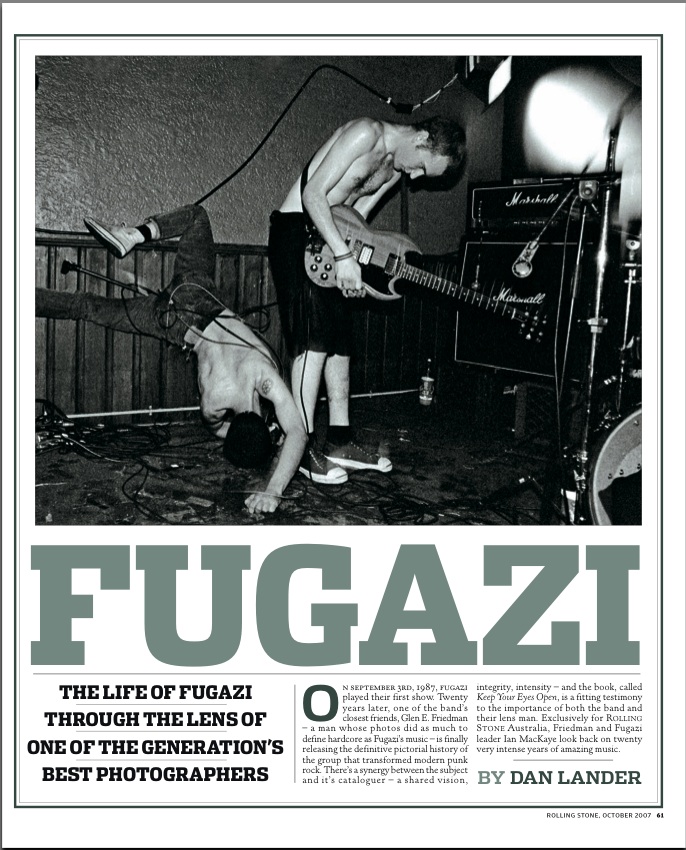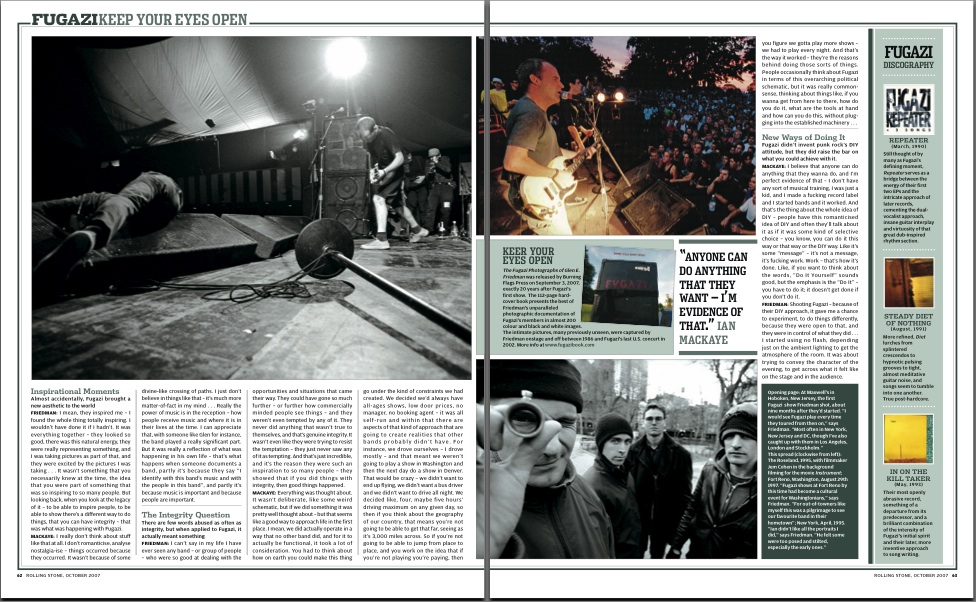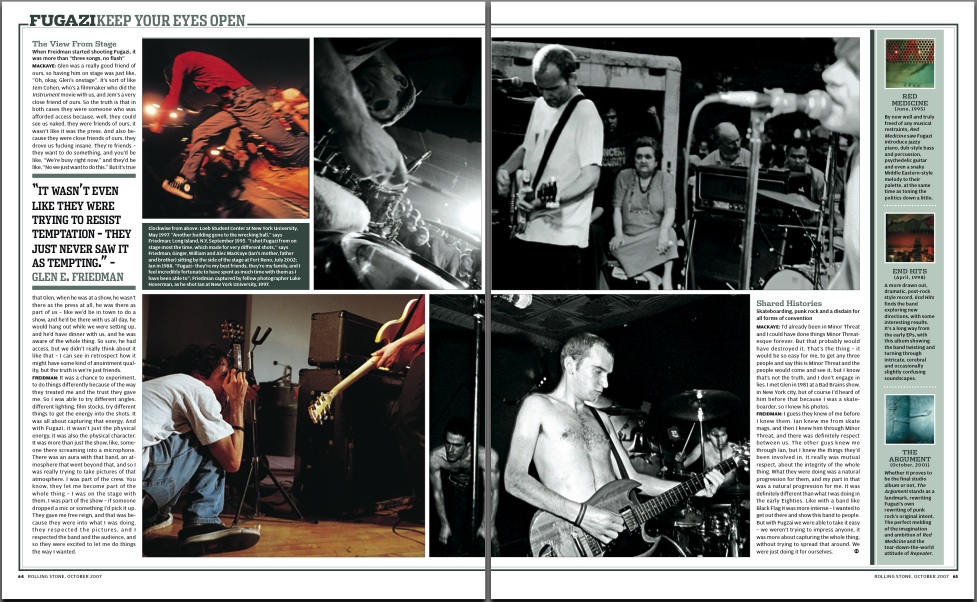ROLLING STONE
magazine (Australia)
October 2007
THE LIFE OF FUGAZI THROUGH THE LENS OF ONE OF THE GENERATION'S BEST PHOTOGRAPHERS

On september 3rd, 1987, fugazi played their first show. Twenty years later, one of the band's closest friends, Glen E. Friedman – a man whose photos did as much to define hardcore as Fugazi's music – is finally releasing the definitive pictorial history of the group that transformed modern punk rock. There's a synergy between the subject and it's cataloguer – a shared vision, integrity, intensity – and the book, called Keep Your Eyes Open, is a fitting testimony to the importance of both the band and their lens man. Exclusively for ROLLING STONEAustralia, Friedman and Fugazi leader Ian MacKaye look back on twenty very intense years of amazing music.
BY DAN LANDER
Inspirational Moments Almost accidentally, Fugazi brought a new aesthetic to the world
FRIEDMAN: I mean, they inspired me – I found the whole thing totally inspiring. I wouldn’t have done it if I hadn’t. It was everything together – they looked so good, there was this natural energy, they were really representing something, and I was taking pictures as part of that, and they were excited by the pictures I was taking . . . It wasn’t something that you necessarily knew at the time, the idea that you were part of something that was so inspiring to so many people. But looking back, when you look at the legacy of it – to be able to inspire people, to be able to show there’s a different way to do things, that you can have integrity – that was what was happening with Fugazi.
MACKAYE: I really don’t think about stuff like that at all. I don’t romanticise, analyse nostalgia-ise – things occurred because they occurred. It wasn’t because of some divine-like crossing of paths. I just don’t believe in things like that – it’s much more matter-of-fact in my mind . . . Really the power of music is in the reception – how people receive music and where it is in their lives at the time. I can appreciate that, with someone like Glen for instance, the band played a really significant part. But it was really a reflection of what was happening in his own life – that’s what happens when someone documents a band, partly it’s because they say “I identifywith this band’s music and with the people in this band”, and partly it’s because music is important and because people are important.
The Integrity Question There are few words abused as often as integrity, but when applied to Fugazi, it actually meant something
FRIEDMAN: I can’t say in my life I have ever seen any band – or group of people – who wereso good at dealing with the opportunities and situations that came their way. They could have gone so much further – or further how commercially minded people see things – and they weren’t even tempted by any of it. They never did anything that wasn’t true to themselves, and that’s genuine integrity. It wasn’t even like they were trying to resist the temptation – they just never saw any of it as tempting. And that’s just incredible, and it’s the reason they were such an inspiration to so many people – they showed that if you did things with integrity,then good things happened.

MACKAYE: Everything was thought about. It wasn’t deliberate, like some weird schematic, but if we did something it was pretty well thought about – but that seems like a good way to approach life in the first place. I mean, we did actually operatein a way that no other band did, and for it to actually be functional, it took a lot of consideration. You had to think about how on earth you could make this thing go under the kind of constraints we had created. We decided we’d always have all-ages shows, low door prices, no manager, no booking agent – it was all self-run and within that there are aspects of that kind of approach that are going to create realities that other bands probably didn’t have. For instance, we drove ourselves – I drove mostly – and that meant we weren’t going to play a show in Washington and then the next day do a show in Denver. That would be crazy – we didn’t want to end up flying, we didn’t want a bus driver and we didn’t want to drive all night. We decided like, four, maybe five hours’ driving maximum on any given day, so then if you think about the geography of our country, that means you’re not going to be able to get that far, seeing as it’s 3,000 miles across. So if you’re not going to be able to jump from place to place, and you work on the idea that if you’re not playing you’re paying, then you figure we gotta play more shows – we had to play every night. And that’s the way it worked – they’re the reasons behind doing those sorts of things. People occasionally think about Fugazi in terms of this overarching political schematic, but it was really common-sense, thinking about things like, if you wanna get from here to there, how do you do it, what are the tools at hand and how can you do this, without plugging into the established machinery . . .
New Ways of Doing It Fugazi didn’t invent punk rock’s DIY attitude, but they did raise the bar on what you could achieve with it.
MACKAYE: I believe that anyone can do anything that they wanna do, and I’m perfect evidence of that – I don’t have any sort of musical training, I was just a kid, and I made a fucking record label and I started bands and it worked. And that’s the thing about the whole idea of DIY – people have this romanticised idea of DIY and often they’ll talk about it as if it was some kind of selective choice – you know, you can do it this way or that way or the DIY way. Like it’s some “message” – it’s not a message, it’s fucking work. Work – that’s how it’s done. Like, if you want to think about the words, “Do It Yourself” sounds good, but the emphasis is the “Do It” – you have to do it; it doesn’t get done if you don’t do it.
FRIEDMAN: Shooting Fugazi – because of their DIY approach, it gave me a chance to experiment, to do things differently, because they were open to that, and they were in control of what they did . . . I started using no flash, depending just on the ambient lighting to get the atmosphere of the room. It was about trying to convey the character of the evening, to get across what it felt like on the stage and in the audience.
KEEP YOUR EYES OPEN The Fugazi Photographs of Glen E. Friedmanwas released by Burning Flags Press on September 3, 2007, exactly 20 years after Fugazi's first show. The 112-page hard- cover book presents the best of Friedman's unparalleled photographic documentation of Fugazi's members in almost 200 colour and black and white images. The intimate pictures, many previously unseen, were captured by Friedman onstage and off between 1986 and Fugazi's last U.S. concert in 2002. More info at www.fugazibook.com
The View From Stage When Freidman started shooting Fugazi, it was more than “three songs, no flash”
MACKAYE: Glen was a really good friend of ours, so having him on stage was just like, “Oh, okay, Glen’s onstage”. It’s sort of like Jem Cohen, who’s a filmmaker who did the Instrumentmovie with us, and Jem’s a very close friend of ours. So the truth is that in both cases they were someone who was afforded access because, well, they could see us naked, they were friends of ours, it wasn’t like it was the press. And also be- cause they were close friends of ours, they drove us fucking insane. They’re friends – they want to do something, and you’d be like, “We’re busy right now,” and they’d be like, “No we just want to do this.” But it’s true that Glen, when he was at a show, he wasn’t there as the press at all, he was there as part of us – like we’d be in town to do a show, and he’d be there with us all day, he would hang out while we were setting up, and he’d have dinner with us, and he was aware of the whole thing. So sure, he had access, but we didn’t really think about it like that – I can see in retrospect how it might have some kind of anointment quality, but the truth is we’re just friends.
FRIEDMAN: It was a chance to experiment, to do things differently because of the way they treated me and the trust they gave me. So I was able to try different angles, different lighting, film stocks, try different things to get the energy into the shots. It was all about capturing that energy. And with Fugazi, it wasn’t just the physical energy, it was also the physical character. It was more than just the show, like, some- one there screaming into a microphone. There was an aura with that band, an at- mosphere that went beyond that, and so I was really trying to take pictures of that atmosphere. I was part of the crew. You know, they let me become part of the whole thing – I was on the stage with them, I was part of the show – if someone dropped a mic or something I’d pick it up. They gave me free reign, and that was be- cause they were into what I was doing, they respected the pictures, and I respected the band and the audience, and so they were excited to let me do things the way I wanted.

“IT WASN’T EVEN LIKE THEY WERE TRYING TO RESIST TEMPTATION- THEY JUST NEVER SAW IT AS TEMPTING.” - GLEN E. FRIEDMAN
Shared Histories Skateboarding, punk rock and a disdain for all forms of convention
MACKAYE: I’d already been in Minor Threat and I could have done things Minor Threat- esque forever. But that probably would have destroyed it. That’s the thing – it would be so easy for me, to get any three people and say this is Minor Threat and the people would come and see it, but I know that’s not the truth, and I don’t engage in lies. I met Glen in 1981 at a Bad Brains show, in New York city, but of course I’d heard of him before that because I was a skate- boarder, so I knew his photos.
FRIEDMAN: I guess they knew of me before I knew them. Ian knew me from skate mags, and then I knew him through Minor Threat, and there was definitely respect between us. The other guys knew me through Ian, but I knew the things they’d been involved in. It really was mutual respect, about the integrity of the whole thing. What they were doing was a natural progression for them, and my part in that was a natural progression for me. It was definitely different than what I was doing in the early Eighties. Like with a band like Black Flag it was more intense – I wanted to get out there and show this band to people. But with Fugzai we were able to take it easy – we weren’t trying to impress anyone, it was more about capturing the whole thing, without trying to spread that around. We were just doing it for ourselves.